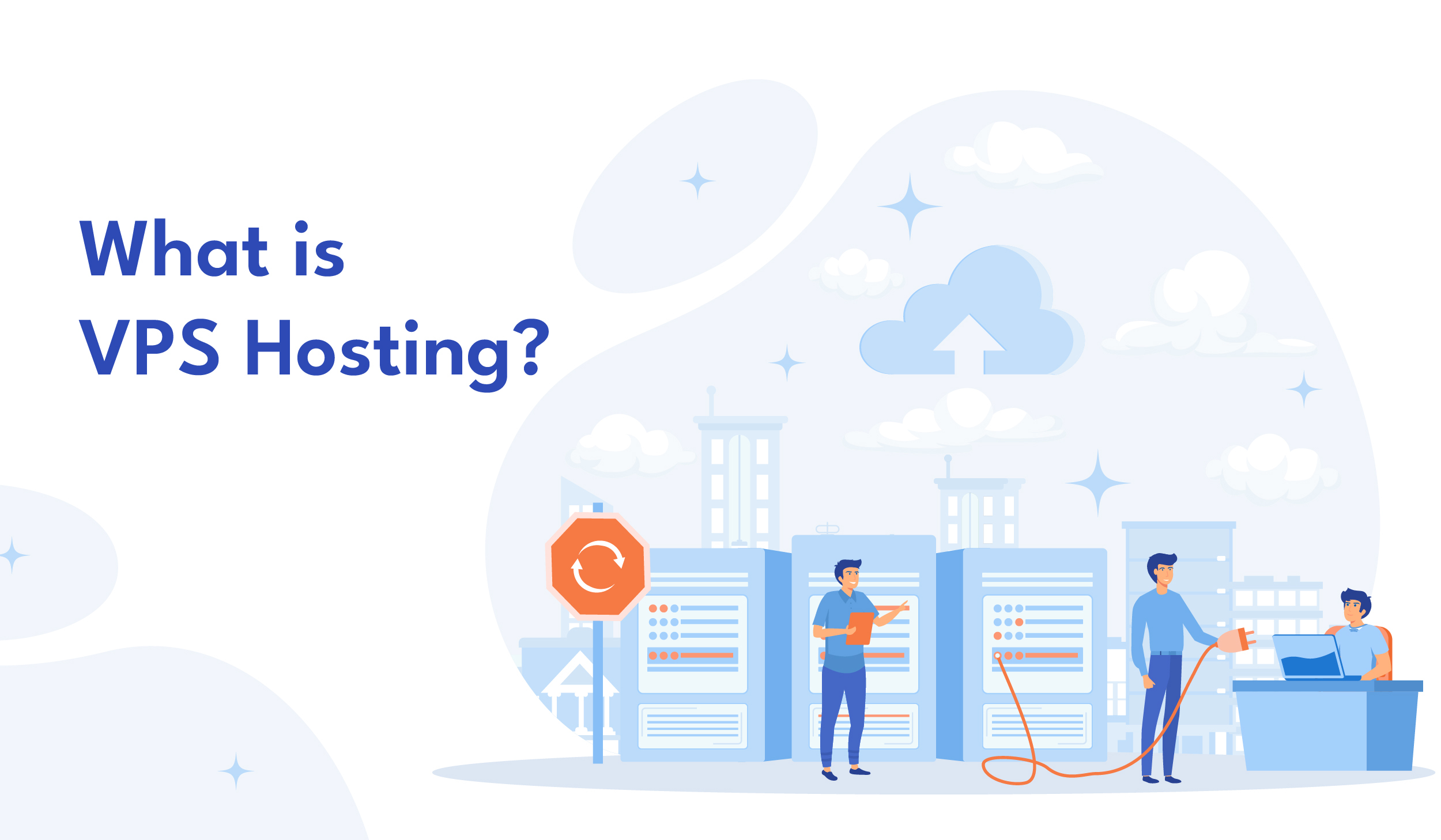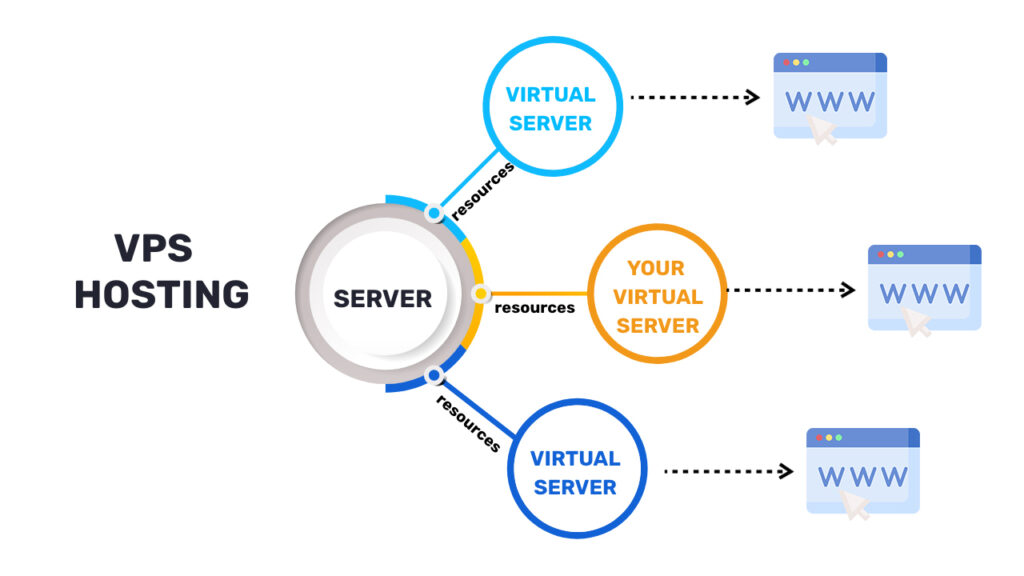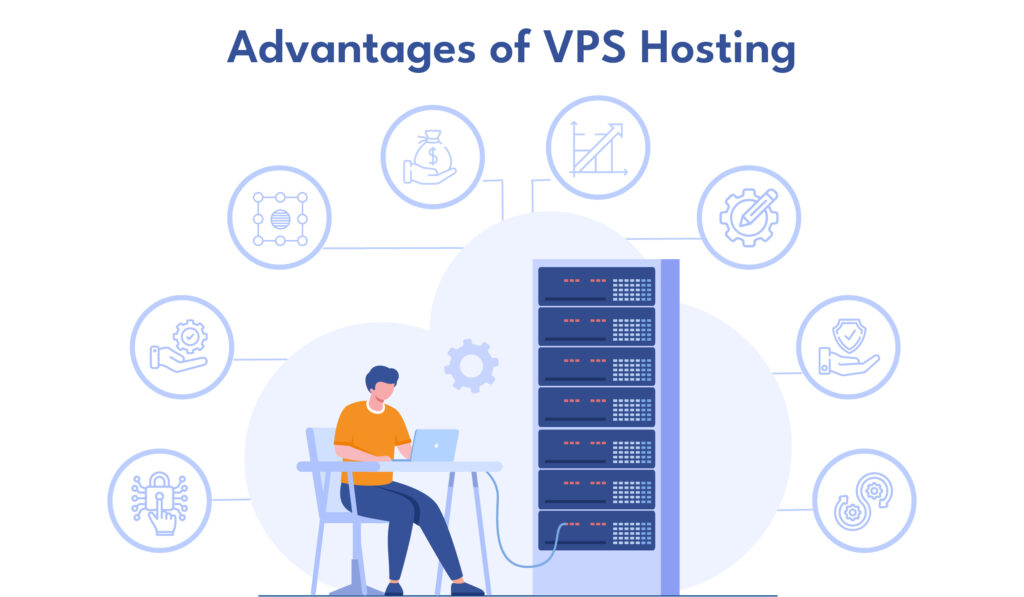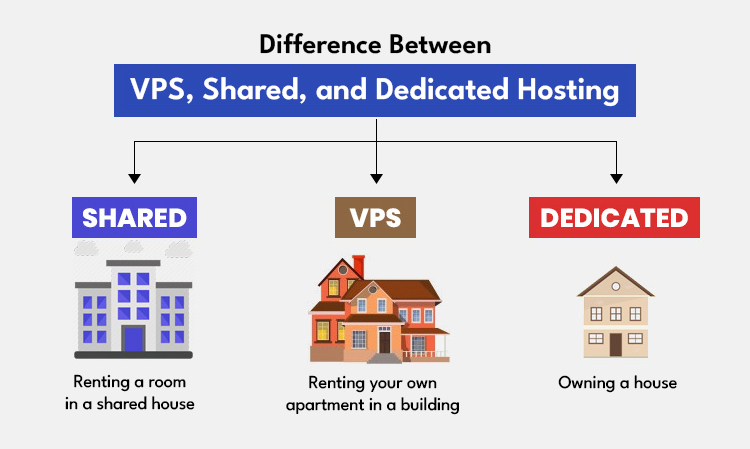
What is a VPS? A detailed guide on VPS Hosting
VPS hosting, short for Virtual Private Server hosting, is a type of web hosting service that offers users a dedicated portion of server resources within a virtualized environment. Unlike shared hosting where multiple websites share the same server resources, VPS hosting partitions a physical server into multiple virtual servers, each with its own operating system, disk space, and bandwidth allocation.
This means that users have more control, security, and customization options compared to shared hosting. VPS hosting is suitable for websites and applications that require more resources and flexibility than shared hosting can provide, but may not need the full power and expense of a dedicated server. It bridges the gap between affordability and performance, allowing users to scale resources according to their specific needs while benefiting from increased reliability and security compared to shared hosting environments.
How VPS Hosting works

VPS hosting works by dividing a single physical server into multiple virtual compartments, each acting like its own independent server. Now, let’s break down the key aspects of VPS hosting to understand how this technology empowers websites to thrive in the digital realm:
Virtualization Magic: Picture a powerful computer split into several compartments. Each compartment acts like its own mini-computer, complete with its own operating system, memory, and processing power. That’s what virtualization does for VPS hosting. It divides a single physical server into multiple virtual compartments, each functioning as an independent server.
Your Private Space: Once the server is divided, you get one of these virtual compartments all to yourself. It’s your private space on the server, just like having your own room in a shared house. This means you have dedicated resources, like CPU power and memory, allocated solely to your website or application.
Isolation Benefits: The beauty of VPS hosting lies in its isolation. Unlike shared hosting where multiple websites share resources and vulnerabilities, your VPS operates in isolation. This means that what happens to other websites on the server won’t affect yours. Your website’s performance and security are safeguarded within your private compartment.
Control at Your Fingertips: With VPS hosting, you’re the captain of your ship. You have full control over your virtual compartment. You can install software, tweak settings, and customize configurations to suit your needs. It’s like having your own mini IT department without the hassle.
Flexible Scaling: As your website grows, so can your virtual compartment. VPS hosting offers scalability, allowing you to easily adjust resources like memory and storage to accommodate increased traffic and demand. It’s like adding more rooms to your house as your family expands.
Use Of VPS Hosting
Virtual Private Servers (VPS) serve as versatile digital spaces, offering users a slice of the internet tailored to their needs. Websites find a reliable home on VPS hosting, ensuring they stay accessible and responsive around the clock. Moreover, developers utilize VPS to create and test software in controlled environments, ensuring smooth deployments. Gaming enthusiasts leverage the use of VPS hosting to host multiplayer game servers, fostering vibrant gaming communities. Following are some common uses of VPS Hosting:
Website Hosting: VPS provides a stable platform for hosting websites, ensuring consistent performance and reliability.
Development and Testing: Developers use VPS to experiment with software configurations and test applications before going live.
Game Server Hosting: Gaming communities thrive on VPS-hosted game servers, offering players a platform for multiplayer experiences.
Remote Desktops and VPNs: VPS enables users to access remote desktops and set up secure virtual private networks (VPNs).
Backup and Storage: VPS serves as a secure backup and storage solution, safeguarding important data and files.
Application Hosting: Various applications, from email servers to databases, find a home on VPS, ensuring efficient operations.
In essence, VPS offers a flexible and reliable solution for a variety of digital needs, empowering users to create, host, and manage their online presence with ease.
Note: To purchase services from the best VPS Hosting provider in India, you must see how the company in performed in past few years.
Advantages of VPS Hosting

When it comes to hosting your website or application, Virtual Private Server (VPS) hosting stands out for its numerous advantages. Unlike shared hosting where resources are shared among multiple users, VPS hosting offers a more personalized and reliable hosting experience. Let’s explore some of the key advantages of VPS hosting:
Enhanced Performance: With VPS hosting, you’re allocated dedicated resources, ensuring consistent performance and faster loading times for your website or application.
Improved Reliability: The isolation provided by VPS hosting means that your website isn’t affected by the activities of other users on the server, leading to better reliability and uptime.
Scalability: VPS hosting allows you to easily scale your resources up or down as needed, ensuring that your hosting plan can adapt to your growing needs or sudden spikes in traffic.
Customization Options: With VPS hosting, you have more control and customization options compared to shared hosting. You can install custom software, configure server settings, and optimize performance to meet your specific requirements.
Enhanced Security: VPS hosting provides a higher level of security compared to shared hosting, as each VPS operates independently, reducing the risk of security breaches and unauthorized access to your website or application.
Cost-Effectiveness: While VPS hosting may be slightly more expensive than shared hosting, it offers better value for money considering the enhanced performance, reliability, and security features it provides.
Root Access: VPS hosting often includes root access or administrative privileges, giving you complete control over your virtual server environment and allowing for advanced configurations tailored to your specific needs.
VPS hosting offers a range of advantages over shared hosting, making it an ideal choice for businesses and individuals looking for a reliable, scalable, and customizable hosting solution.
Security offered by VPS Hosting
VPS hosting offers enhanced security compared to shared hosting by providing isolation, dedicated resources, and greater control over server configurations. Each virtual server operates independently, reducing the risk of security breaches from neighboring sites. With root access, users can implement custom security measures such as firewalls, encryption, and regular security updates to protect against threats. Additionally, VPS hosting providers often offer 24/7 monitoring and support to detect and respond to security incidents promptly. In summary, VPS hosting offers a secure hosting environment suitable for websites and applications that prioritize data protection and security.
Difference between VPS Hosting, Shared Hosting, and Dedicated Hosting

This section delves into the differences between VPS (Virtual Private Server) hosting, shared hosting, and dedicated hosting. Understanding the distinctions among these hosting options is crucial for selecting the most suitable solution for your website or application. Whether you’re seeking cost-effectiveness, scalability, or robust performance, discerning the nuances between these hosting types will aid you in making an informed decision. Let’s explore the contrasts:
Shared Hosting
- Shared hosting is like renting a room in a shared house. You and several other tenants share the same space (server) and resources (like CPU, RAM, and storage).
- It’s the most budget-friendly option as costs are divided among multiple users.
- However, since resources are shared, if one website uses a lot of resources, it can slow down others on the same server.
- Shared hosting is suitable for small websites or beginners who don’t expect high traffic or need advanced features.
VPS Hosting (Virtual Private Server):
- VPS hosting is like renting your own apartment in a building. While you’re still in the same building (server) with others, you have your own dedicated space and resources.
- Each VPS operates independently with its own operating system, allowing for greater control and customization.
- It offers better performance and security compared to shared hosting because resources aren’t shared with other users.
- VPS hosting is suitable for websites that need more control, reliability, and flexibility than shared hosting can provide, but don’t require the resources of a dedicated server.
Dedicated Hosting:
- Dedicated hosting is like owning a house. You have the entire server to yourself, with all its resources dedicated solely to your website or application.
- It offers the highest level of performance, security, and customization since you have full control over the server.
- Dedicated hosting is suitable for large websites with high traffic, e-commerce platforms, or applications that require maximum performance and security.
- However, it’s the most expensive option as you’re responsible for the entire server’s cost and maintenance.
Different Types of VPS Hosting Offered
Managed VPS Hosting:
- Managed VPS hosting is a service where the hosting provider takes care of server management tasks such as software updates, security patches, and technical support.
- With managed VPS hosting, users can focus on their websites or applications without worrying about server maintenance tasks.
- This option is ideal for users who lack the technical expertise or time to manage their servers and prefer to have the hosting provider handle these responsibilities.
Unmanaged VPS Hosting:
- Unmanaged VPS hosting provides users with full control over their virtual servers, including server administration, software installations, and security configurations.
- Users are responsible for managing and maintaining their VPS, including installing and configuring software, monitoring server performance, and applying security updates.
- Unmanaged VPS hosting is suitable for users with technical expertise who prefer to have complete control over their server environment and customization options.
Linux VPS Hosting:
- Linux VPS hosting utilizes the Linux operating system as the server’s operating system.
- Linux offers a wide range of distributions (such as Ubuntu, CentOS, and Debian), each with its own set of features, stability, and support.
- Linux VPS hosting is popular for its stability, security, flexibility, and cost-effectiveness. It supports various open-source applications and technologies, making it a preferred choice for developers and businesses.
Windows VPS Hosting:
- Windows VPS hosting is designed for users who prefer to use Windows-based operating systems such as Windows Server for their virtual servers.
- It offers compatibility with Windows-specific applications, software, and development environments, making it suitable for businesses and individuals familiar with the Windows ecosystem.
- Windows VPS hosting provides features such as remote desktop access, ASP.NET support, and compatibility with Microsoft technologies.
When you should switch to VPS Hosting
Deciding when to switch to VPS hosting depends on several factors, including your website’s performance, traffic levels, security needs, and budget.
You should consider switching to VPS hosting when your website outgrows the limitations of shared hosting. Shared hosting is suitable for small websites with low to moderate traffic, but as your website grows and receives more visitors, shared hosting may no longer provide the performance and reliability you need.
VPS hosting offers dedicated resources, including CPU, RAM, and storage, which can significantly improve your website’s performance and stability. Additionally, VPS hosting provides greater control over server configurations and enhanced security features, making it a better choice for websites with higher security requirements. If you’re experiencing slow loading times, frequent downtime, or security issues on your shared hosting plan, it may be time to consider upgrading to VPS hosting to ensure your website continues to provide a seamless user experience.
Conclusion
VPS hosting offers a robust and versatile solution for individuals and businesses seeking reliable and scalable hosting services. By providing a virtualized environment with dedicated resources, VPS hosting ensures optimal performance, security, and control over server configurations. We’ve explored the different types of VPS hosting, including managed and unmanaged options, as well as Linux and Windows-based servers, catering to a diverse range of needs and preferences. The benefits of VPS hosting, such as enhanced performance, scalability, and security, make it a preferred choice for websites and applications experiencing growth or requiring advanced features. Moreover, we’ve highlighted the key differences between VPS hosting and other types of hosting, emphasizing the advantages of VPS in terms of resource allocation, customization options, and security measures. Whether you’re running a small blog or managing a high-traffic e-commerce site, VPS hosting offers the flexibility and reliability needed to support your online endeavors effectively.
Frequently Asked Question on VPS Hosting
Q1: What is VPS used for?
VPS (Virtual Private Server) hosting is used for hosting websites, running web applications, creating development environments, hosting game servers, and setting up remote desktops and VPNs
Q2: What is the VPS hosting service
VPS hosting service provides users with a dedicated virtual environment on a shared physical server, offering enhanced control, security, and performance compared to shared hosting.
Q3: Why do I need VPS
You need VPS (Virtual Private Server) hosting for improved performance, security, and control over your website or application, especially as it grows in size and traffic.
Q4: Is VPS safe?
Yes, VPS hosting is generally safe. It offers better security compared to shared hosting as each virtual server operates independently, reducing the risk of security breaches from other users.
Q5: Which VPS is best?
The best VPS depends on your specific needs, such as performance requirements, budget, and technical expertise. Research and compare various providers to find the one that offers the features and support that align with your requirements.
Q6: Difference between VPS and VPN
VPS (Virtual Private Server) is a hosting service that provides users with a dedicated virtual server for hosting websites and applications. VPN (Virtual Private Network), on the other hand, is a technology that allows users to create a secure connection over the internet, providing privacy and anonymity by masking their IP address and encrypting their internet traffic.
Q7: VPS or cloud, which is better?
Choosing between VPS and cloud depends on your specific needs. VPS offers dedicated resources and predictable performance, while cloud provides scalability and flexibility. Consider your requirements for performance, scalability, and budget to determine which option is better suited for you.
Q8: Which operating system does VPS work on?
VPS hosting can work on various operating systems, including Linux and Windows.





 – A
– A 